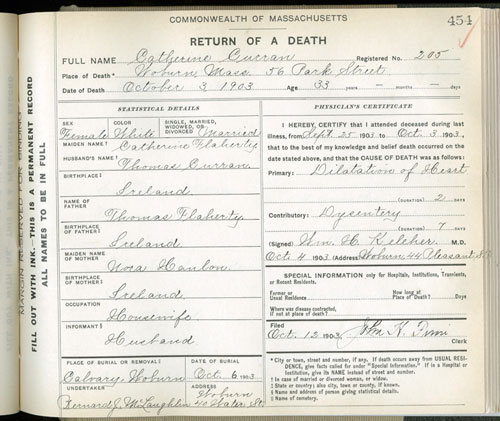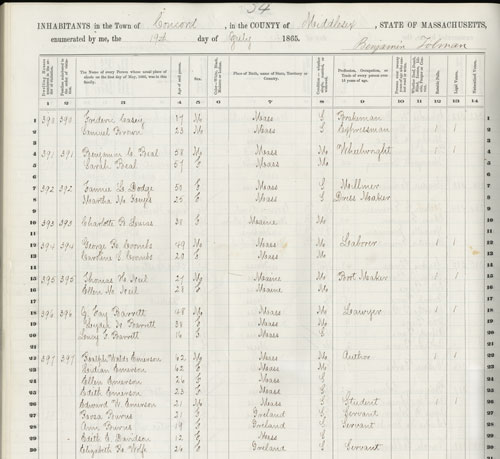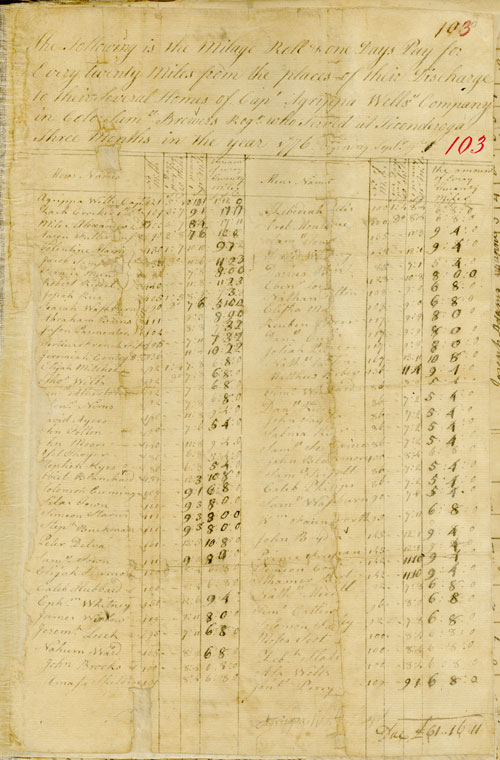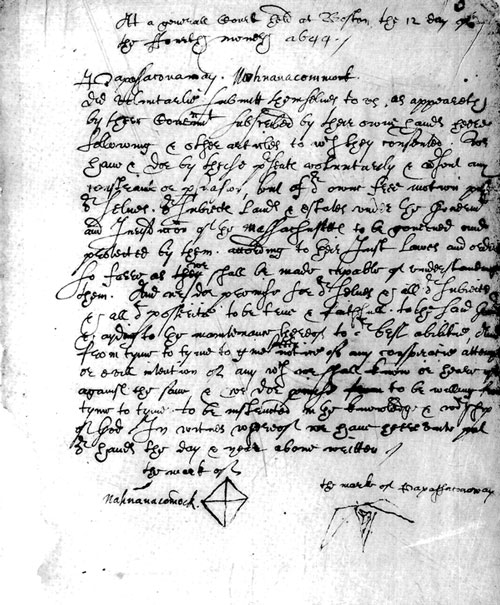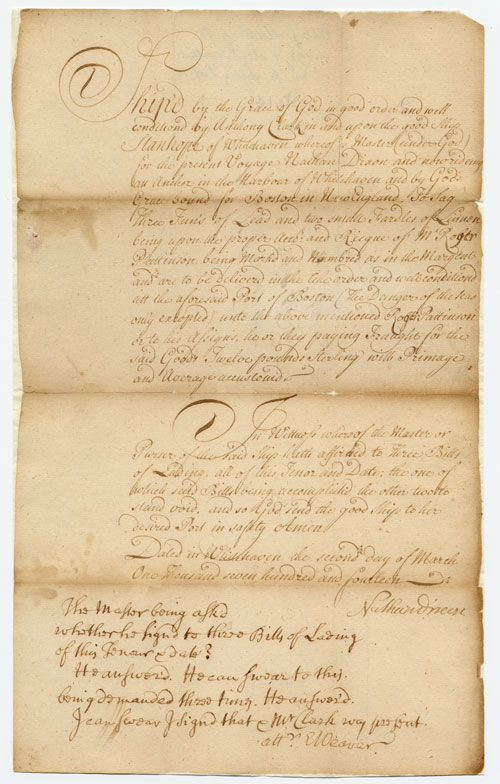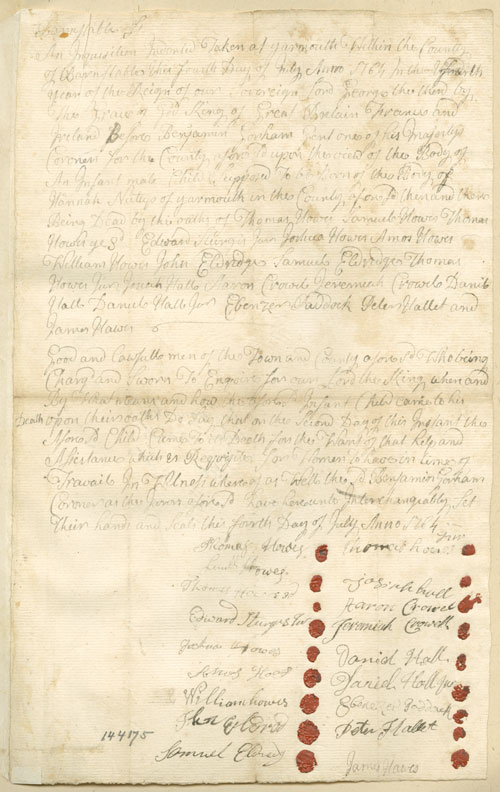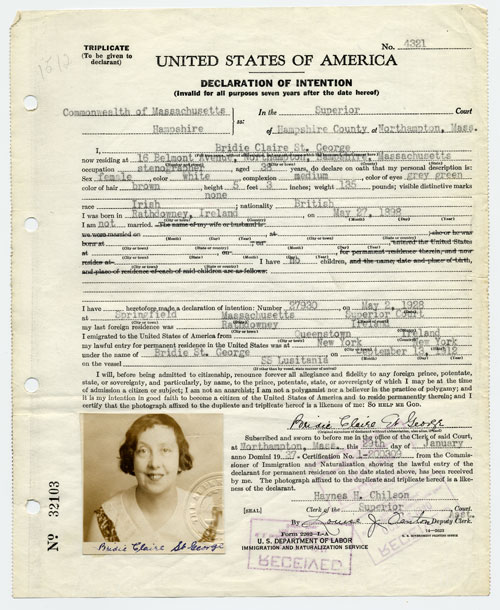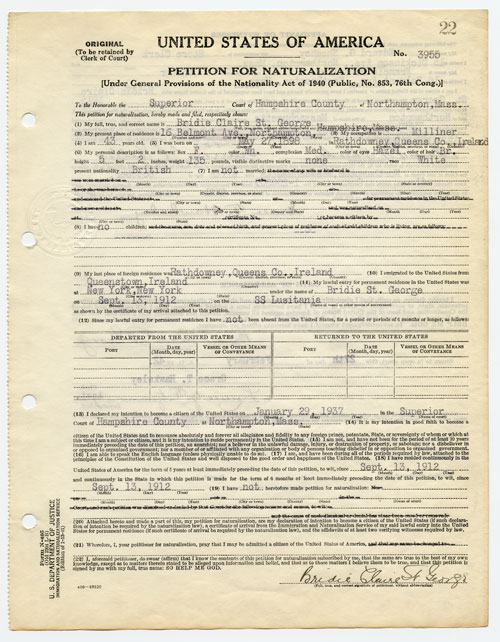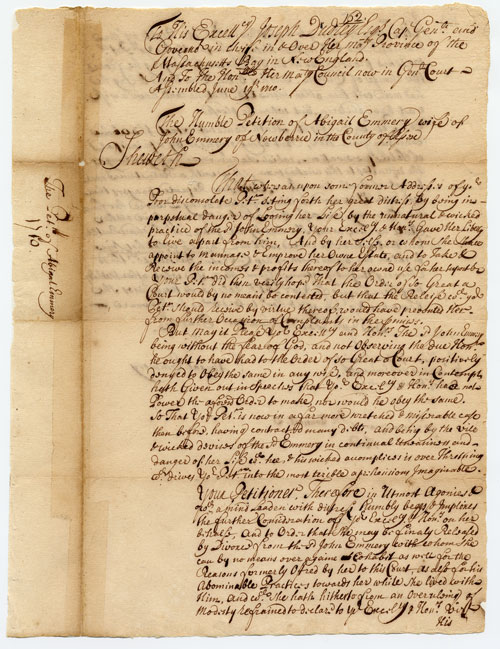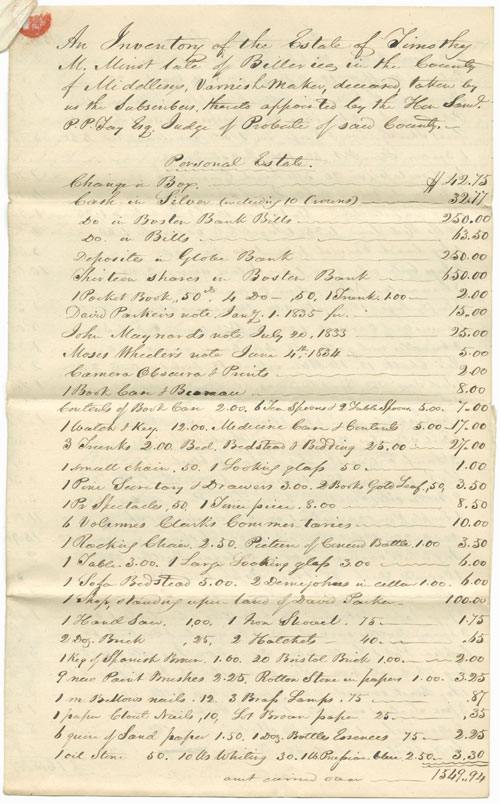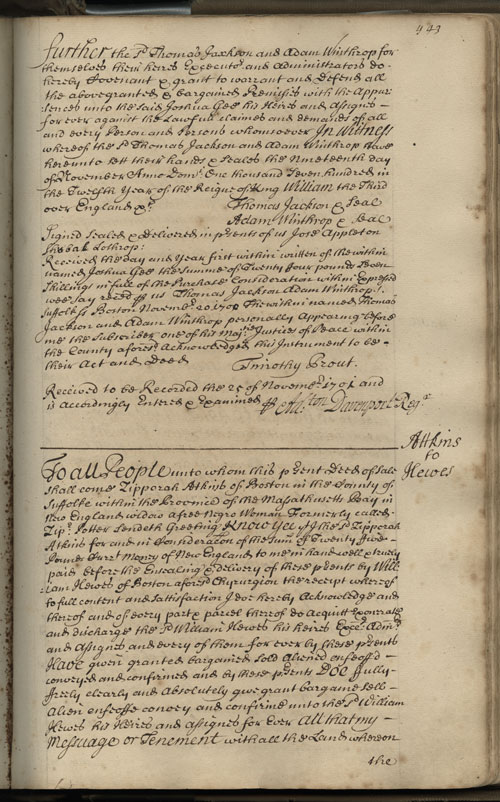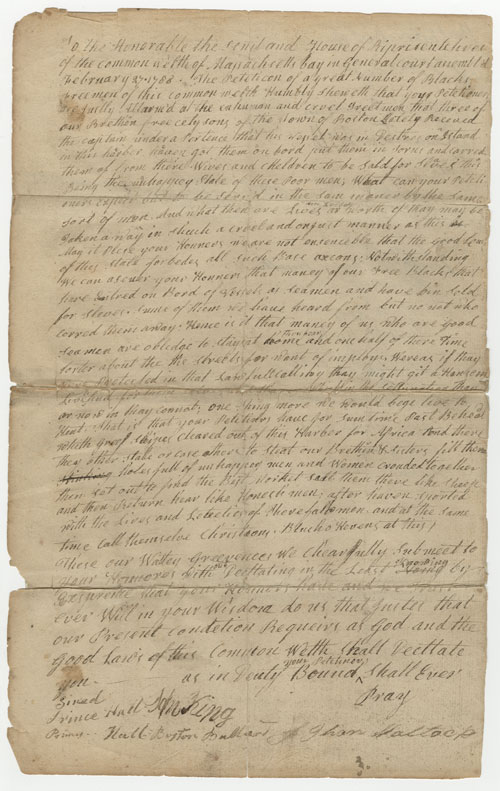Researching Your Family’s History at the Massachusetts Archives
source: Archives: Researching Your Family's History at the Massachusetts Archives
Introduction
The Archives, a division of the Office of the Secretary of the Commonwealth, is the repository for Massachusetts records generated by state government. Archives holdings date from the beginning of the Massachusetts Bay Colony in 1628 and document the settlement of lands in Maine and Massachusetts, the arrival of immigrants, and the development of state government. Public records are not in the holdings of the Archives because of inherent genealogical value. However, these documents can be an important resource for people engaged in the study of family history.
In addition to the archival records created by Massachusetts state agencies, the Archives has a limited selection of books and microforms to aid genealogists and other researchers.
Access to these materials is provided through the Reading Room of the Massachusetts Archives at Columbia Point. It is open weekdays, 9 to 5, except on legal holidays.
Passenger Lists
Massachusetts officials started recording the names of immigrants who arrived by ship to the Port of Boston in 1848, a procedure that continued until 1891, when federal record-keeping programs superseded those of the state.
These records are arranged chronologically according to the date when the ship arrived in port. Facilitating the use of the passenger lists is an alphabetical name index. Information available from the lists includes the name, age, sex and occupation of the immigrant; the country of birth; and previous residence. Also included are the name of the ship, and the date of its arrival in Boston. It is important to note that the passenger lists do not generally provide information about the county or town where the immigrant originally lived.
Over one million immigrants came through the Port of Boston between 1848 and 1891. With the invaluable assistance of our volunteers, the Massachusetts Archives is engaged in a multi-year project to convert this voluminous amount of information into a database, which is available on the Archives website:
Passenger Manifest (1848-1891) ContentsAs new surnames are entered into the database, the website is updated periodically to reflect these additions.
Passenger lists for other years and ports can be found at the National Archives Northeast Regional Branch (380 Trapelo Road, Waltham, MA 02452), as the federal government was recording incoming passenger lists from the 1820's onward. Researchers may contact the National Archives at 781-663-0130, or through their website:
www.archives.gov/northeast/boston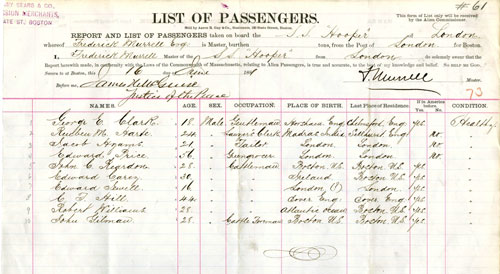
Passenger manifest for the Missouri, arriving February 15, 1882
Vital Records: Pre 1841
City and town clerks in Massachusetts are the custodians of pre-1841 vital records for their respective towns. A list of all the city and town clerks in Massachusetts can be found at:
Massachusetts City and Town DirectoryAlthough the Massachusetts Archives does not have original pre-1841 vital records, we do hold two collections that can be utilized by researchers. An incomplete collection of the printed volumes of Vital Records Prior to 1850, which are organized by town, are available in our Reading Room and in many research libraries, including the Massachusetts State Library. The Archives also holds a miscellaneous collection of microfilm that has been deposited with the Archives by the Genealogical Society of Utah. We will not be receiving additional microfilm in this collection. While the types of records vary for each municipality, this film includes records normally found in the municipal clerks' offices. Among these are vital records, records of town meetings, as well as church and cemetery records.
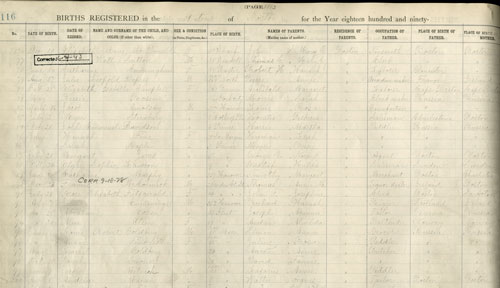
Birth registration, Town of Burlington, 1896
Vital Records: 1841-1920
The Archives hold births, marriages, and deaths for all Massachusetts cities and towns, 1841 through 1920. Municipal clerks submitted these registration pages to the state annually covering the vital records generated by their offices. While there is some variation in this information, generally the books provide names, dates, residences, occupations, and parental information. From 1903 forward, death records also include the place of burial. The Archives also holds added entries and corrections to vital records for the same period. Certain amended volumes are available on microfilm in the Reading Room. Later records in this collection will be transferred to the Archives at five-year intervals.
Access to the information contained in the vital records registration volumes is gained by consulting index books. The index books are organized in five-year intervals; within each index, the names are listed alphabetically. Reference staff in the Archives will assist researchers in the use of these materials.
In the future, additional indices will be made available on the Massachusetts Archives website.
Death registration, Town of Woburn, 1903
Vital Records: Post 1920
Vital records after 1920 are located at the municipal clerks' offices and the Department of Public Health, Registry of Vital Records and Statistics (150 Mount Vernon Street, Dorchester, MA 02125). Researchers may contact the Registry of Vital Records at 617-740-2600, or through the DPH website:
http://www.mass.gov/eohhs/gov/departments/dph/programs/vital-records.htmlIndices of the DPH vital records volumes through 1971 are available at the Archives, although there are no copies of the actual records at the Archives. These indices can be used by visitors to the Reading Room.
Census Schedules
Massachusetts State Census
The Massachusetts Archives holds state census schedules from 1855 and 1865. Although the state conducted a census up to 1975, the 1855 and 1865 censuses are the only two surviving schedules. The information contained in the state census is similar to that of contemporary federal returns and is arranged in a similar manner. A name index for these schedules exists for many of the small towns in Essex, Middlesex, and Norfolk counties, as well as the City of Charlestown.
Federal Census
Federal census schedules date back to 1790. Recorded on a decennial basis, they constitute a major resource for genealogy. Originally a fairly simple list of the heads of households, the population schedules became more detailed and new schedules were added as the nineteenth century progressed. By 1850, the general population schedules list all individuals residing in a house and provide data on their age, occupation, place of birth, and value of real estate.
Additional schedules providing social and mortuary statistics and the products of industry and agriculture were also present by 1850. All of the schedules are broken down by counties and municipalities. Large cities are further subdivided into wards and enumeration districts.
The Archives holds microfilm of federal census population schedules dated 1790 through 1880, and 1900 through 1920. The 1890 population schedules were destroyed during a fire in Washington, D.C., in 1921. A special 1890 census of Union war veterans and widows of veterans is available at the Archives on microfilm.
Printed indices for census schedules dating 1790 through 1850, and the 1890 war veterans census, are at the Archives. The various regional facilities of the National Archives, including the Northeast Regional Branch (380 Trapelo Road, Waltham, MA 02452) are able to provide access to all Federal census schedules currently released. The Northeast regional branch can be contacted at 781-663-0130, or through their website:
www.archives.gov/northeast/bostonRegister of the 1865 Massachusetts state census, listing the Emerson family in Concord
Military Records
Military records in the Archives cover conflicts dating from the seventeenth through the twentieth centuries; those most useful to genealogists date from 1643 to 1865. The records can be used to identify the service of particular individuals but provide little background on the person's family or life.
Information concerning military service in the colonial wars (circa 1643-1774) can be gleaned from legislative records and a variety of military rolls and accounts. Similar rolls from the Revolutionary period document the service of soldiers in the state militia; there are also a limited number of Continental Army rolls. Additionally the Archives holds records of state pensions, bounties, and Maine land grants for Revolutionary War veterans, or their heirs, who were not eligible to receive federal pensions. Family relationships may be included in the pension records, as heirs tried to document their status. Military records from the colonial wars and the Revolution are indexed by name and are available on microfilm at the Archives. Revolutionary service is also referenced through the seventeen-volume set, Massachusetts Soldiers and Sailors of the Revolutionary War, created from documents held by the Massachusetts Archives.
Payrolls and other military records at the Archives may also be used to document the garrison on Castle Island in Boston Harbor. Following the Revolution, soldiers continued to be stationed at the Castle as a defense for the harbor. These soldiers guarded the state prison that existed there between 1785 and 1798.
Included in the Massachusetts Archives Collection (see following section) are records from Shays' Rebellion, a period of internal turbulence dated 1786-87, as well as records of the state treasurer and the commissary general. Letters, orders, warrants, petitions, special reports, military payrolls, service certificates, financial records, and oaths of allegiance provide extensive documentation of Shays' Rebellion. Partial indices exist with names of soldiers and individuals who supplied or housed the army.
Military records relating to the War of 1812 (1812-1815) are found in the records of the Governor and Executive Council; these are concerned primarily with the formation of militia units and commissions for officers. Records of the Massachusetts Militia in the War of 1812-1814 provides information on the militia regiments called out in 1814 in anticipation of a British attack on Massachusetts.
The most complete list of Massachusetts men who served in the Civil War is found in the multi-volume set, Massachusetts Soldiers, Sailors and Marines in the Civil War. Civil War records held by the Archives include a variety of muster, clothing and descriptive rolls, lists of assignments of recruits to particular town quotas, materials documenting the use of substitutes for draftees, and records of Massachusetts bounty payments to southern African-Americans who were recruited into the U.S. Army. Additional archival materials from this period include the records of the State Military Agent and the letterbooks of Governor John Andrew, an early and strong supporter of the war effort.
Records relating to the Spanish-American War (1898) include a small collection of letters and petitions for bonuses from veterans or their families to the state treasurer.
Additional State Military Records
The Massachusetts Adjutant General's Office oversees a large collection of military records. Those records relating to the Mexican War, Civil War, Spanish-American War, and World War I are maintained in Worcester at the Massachusetts National Guard Museum, 44 Salisbury Street, Worcester, MA 01609. The Museum can be contacted at 508-797-0334. Military records dating after 1940 are available through the Military War Records Office of the Adjutant General's Office, 50 Maple Street, Milford, MA 01757, or by calling 508-233-7780.
Pay roll for Capt. Agrippa Wells' Company in Col. Samuel Brewster's Regiment, 1776
The Massachusetts Archives Collection
The Massachusetts Archives Collection (or Felt Collection) is an important source of records for early Massachusetts, Maine, and New Hampshire families. Documenting the development of the Massachusetts Bay government and settlement of its lands between 1630 and 1800, the collection includes original records of the Governor, Council, the General Court, the state secretary, and the treasurer. These cover a wide range of topics of interest to genealogists: land grants; early records of divorces and contested estates; legislative papers relating to towns, including petitions and remonstrances; military records from 1643 through 1775; records of mercantile affairs; and tax valuation lists.
The records were originally bound into 328 volumes, generally arranged by topic. Most of the volumes have a table of contents and many have been indexed. Access to the collection includes a card catalogue for approximately one quarter of the collection, a calendar index, and a database that provides name, location, and subject access for eighteen volumes. The database can be accessed through the Archives website at:
Massachusetts Archives Collection
It is updated and expanded as additional Massachusetts Archives volumes are catalogued.
Agreement signed by Nahnaacomoc and Passaconaway, June 12, 1644, taken from Massachusetts Archives collection, volume 30
Papers Relating to Maine
Maine was part of Massachusetts from the early colonial period through 1820, and there are many records in the Archives pertaining to the settlement and settlers of Maine. The Massachusetts Archives Collection contains a variety of Maine records dating from the seventeenth and eighteenth centuries; Maine records are not grouped separately within this collection. There are numerous records relating to eighteenth-century forts and Indian truckhouses (trading posts), especially for the one located at Machias. In addition, both passed and unpassed legislation contain petitions, remonstrances, reports, and correspondence relating to Maine from 1780 to 1820.
The Eastern Lands papers focus on the settlement of public lands in the District of Maine and its separation from Massachusetts as a state in 1820. Legal, survey, and financial records of the General Court, and records of legislative commissions and the Land Office are included in the Eastern Lands papers. Researchers will also find copies of deeds for land conveyed by the Committee for the Sale of Eastern Lands and the Land Agent, records establishing land titles in disputed areas, and extensive correspondence regarding road construction, land settlement, and the development of Maine's natural resources. The Archives holds indices to several volumes of the deeds, and to the correspondence dating 1783 through 1867.
Maine vital records are not part of the Massachusetts Archives holdings. Researchers should contact the Maine State Archives or the appropriate city or town clerk regarding Maine vital records.
Plymouth Colony Records
Plymouth Colony, also known as the Old Colony, existed as a separate entity throughout most of the seventeenth century; it was officially merged into the Province of the Massachusetts Bay in 1692. Plymouth Colony consisted of towns currently located in Plymouth, Barnstable, and Bristol Counties. The original colony records for Plymouth, including wills and deeds, are maintained at the Plymouth County Commissioners Office in Plymouth. The Massachusetts Archives holds manuscript transcriptions of these records, with accompanying name indices. Some of the Plymouth Colony records, along with the records from the Commissioners of the United Colonies, were published in a twelve-volume set, Records of Plymouth Colony, available at the Massachusetts Archives and the Massachusetts State Library.
Records of State Institutions
It is very important to note that per Massachusetts state laws, access to the records of state institutions may be restricted to preserve the privacy of individuals at the institution. Medical (Massachusetts General Law4§7(26)c, MGL111§70E, MGL123§36), mental health (MGL123§36), personal (MGL4§7(26)c, o, p, MGL6A§1), evaluative (MGL66A§1), and criminal (MGL4§7(26)c, MGL6§167) information is restricted according to state laws. Criminal offender information is open upon the death of the individual, but medical and mental health records remain restricted. Researchers MUST contact the Archives before planning a visit to use these records in order to determine what restrictions will apply.
The Massachusetts Archives holds the records of a variety of state institutions, including prisons, almshouses, mental health facilities, public hospitals and sanatoriums, and reform schools. These records were created by a number of state agencies, including corrections, youth services, public health, public welfare, and mental health. The records vary from institution to institution, but can include records such as case files and histories, records of admissions and discharges, and other records that provide information on the lives and families of people at these institutions. Please contact the Archives to determine whether records are held for a specific institution and time frame.
Criminal offender record information (CORI) is open upon the death of the individual, but medical and mental health information remains restricted. Researchers MUST contact the Archives before planning a visit to use the records in order to determine applicable restrictions and how you might access the information.
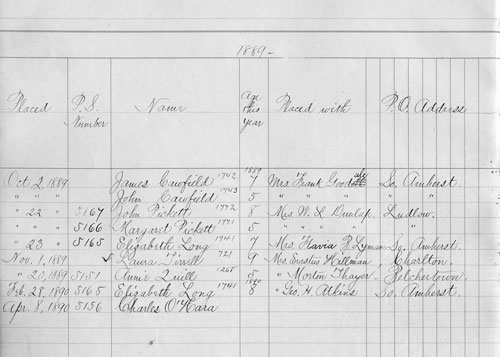
Monson Primary School, Boarding Out Register, 1889
Massachusetts Supreme Judicial Court Archives
The Massachusetts Supreme Judicial Court Archives is a separate and distinct repository, collecting records from state, county, and local courts. Reference requests for judicial records should be addressed to the Judicial Archivist for the Massachusetts Supreme Judicial Court Archives, Elizabeth Bouvier. She can be reached at 617-557-1082 or by email at:
elizabeth.bouvier@sjc.state.ma.usJudicial records are an invaluable resource for genealogical researchers, and a small percentage of their holdings have been made available in the Massachusetts Archives Reading Room. These holdings include microfilm of select probate, naturalization, and divorce records, and some colonial era court records. Please contact Massachusetts Archives staff for additional information about this microfilm. The Massachusetts Archives does not hold the originals of these records, and all questions about judicial records and the Massachusetts judicial system should be directed to the Judicial Archivist.
Admiralty Court, File paper, March 2, 1714
The Suffolk Files
The Suffolk Files contain the earliest file papers of the Massachusetts Supreme Judicial Court and its predecessors, the Court of Assistants and the Superior Court of Judicature (1620-1800). There are also some records of the county courts and the Court of Common Pleas and General Sessions of the Peace. The records contain cases not just from Suffolk County, but from Massachusetts and parts of Maine and New Hampshire. This was the result of the circuit nature of several of the courts and the fact that most of the action brought before the upper courts had been appealed from lower courts throughout the region. Extensive indices of every person, place, and subject, as well as date and calendar indices were prepared. Microfilm of the Suffolk Files and indices is available in the Massachusetts Archives Reading Room.
Suffolk Files, inquest from 1764
Naturalizations
The Judicial Archives holds naturalization records, which document the process of becoming a citizen, for those persons who were naturalized in the state Superior Courts and local District Courts. The records usually include the declaration of intent and petition for naturalization. Declarations filed after January 1930 generally contain a photograph of the applicant.
Information found in the declaration of intent and the petition for naturalization may include the name, address, occupation, and date and place of birth of the applicant and information regarding arrival in the United States; marital status and the names of children, along with their dates and places of birth. Prior to 1922, married women are included on their husband's petition. Minor children derived citizenship from their parents.
Declaration of Intent, Hampshire County
There is no statewide index to the naturalization records at the Judicial Archives, since each court was responsible for indexing its own records. In order to locate the proper court and date of naturalization for records between 1790 and 1906, researchers should consult the Soundex index to New England naturalizations, available at the Northeast regional branch of the National Archives in Waltham. Indices of naturalization records for specific Massachusetts courts, especially post-1905 Superior Courts, may be accessible on microfilm or by contacting the Judicial Archives.
The Massachusetts Archives holds abstracts of naturalizations from state and local courts, 1885-1931, filed with the Secretary of the Commonwealth pursuant to Chapter 345 of the Acts of 1885. These records have been microfilmed; they are arranged chronologically by year, and each volume is indexed separately, making them awkward to use. The abstracts provide the following information about the naturalized person: name, age, occupation and residence; also the name of the court and the date of naturalization. Although they do not provide much genealogical information, the abstracts are useful in directing the researcher to the location of the original records.
Additional information on Massachusetts naturalizations is available from the Northeast regional branch of the National Archives in Waltham. Its holdings include photostatic copies of state and local court records (1790-1906), which are indexed through Soundex index cards; U.S. District Court naturalization records (1790-1991); and U.S. Circuit Court naturalization records (1845-1911).
Petition for Naturalization, Hampshire County
Divorces
Divorce cases have been heard in Massachusetts courts starting as early as 1639.
In the colonial period (1629-1692), divorce petitions could filed in a variety of courts, including the Court of Assistants, the General Court, and the county courts. Records of the General Court and the Court of Assistants have been published. Original records are located in the Suffolk Files, the Massachusetts Archives Collection, and the records of the county courts.
During the provincial period (1692-1775), primary jurisdiction for divorces rested with the Governor and Council, although six petitions dating 1755 to 1757 were heard by the General Court. Again, the original records will be found in the Massachusetts Archives Collection, the Suffolk Files, Council records, and county courts.
From 1775-1785 the Council had jurisdiction; records are located in the Massachusetts Archives Collection and the Council records.
In 1786, the Supreme Judicial Court was given jurisdiction over divorce cases. Records dating 1786-1796 are located in the Suffolk Files collection and recorded in the SJC record books. After 1796, summary information regarding divorces is included in the SJC record books, which are indexed and arranged by county. Case papers are also generally available.
Jurisdiction over divorce cases changed in 1887, when the Superior Courts were authorized to handle divorces. Records from this period are indexed in separate divorce docket books for the Superior Courts in the various counties.
In 1922, the county probate courts were granted concurrent jurisdiction with the Superior Courts, but since that date most divorces have been heard in county probate and family courts. Records since 1922 are maintained in the counties; an index for cases since 1952 is available at the Department of Public Health, Registry of Vital Records and Statistics (150 Mount Vernon Street, Dorchester, MA 02125). Researchers may contact the Registry of Vital Records at 617-740-2600, or through the DPH website:
www.mass.gov/dph/rvrsPetition of Abigail Emmery requesting a divorce, 1710
Probate
Probate records, including the administration of estates, probate of wills, and the appointment of guardians, have been under the jurisdiction of the courts since the 1630s. County courts and later, county judges of probate, were responsible for these functions until 1783, when the probate courts were established. In the nineteenth and twentieth centuries, probate and family courts were given jurisdiction over adoptions, divorces, name changes, and domestic relations.
These records are indexed by county; there is no statewide index available. Indices will provide docket numbers, and the docket books will provide access to the record books, which are contemporary copies of the file papers. Not all of the counties have both file papers and record books available through the Judicial Archives; Massachusetts Archives Reference staff has information on the specific records available for research on microfilm. Researchers looking for seventeenth-century probate records should also consult the Massachusetts Archives Collection, the Suffolk County probate index (for Essex County), the Suffolk Files, the Essex County Quarterly Court records, and the Middlesex Folio Collection.
Middlesex County Probate file, inventory of Timothy Minot, 1838
Name Changes
Prior to 1852, name changes were administered by the General Court. Anyone interested in a legal change of name submitted a petition to the legislature requesting the change. The petition and resulting legislation are held by the Massachusetts Archives. Petitions that did not receive legislative approval for name changes are also maintained by the Archives.
Chapter 256, Acts of 1851, transferred jurisdiction over name changes to the county probate courts. Annual returns of name changes were sent by the probate courts to the state secretary's office until 1900. The returns were also published annually in the printed volumes of Acts and Resolves, 1852-1913. Name changes dating between 1780 and 1892, including both those enacted by the legislature and those decreed by the probate judges, were published in the volume List of Persons Whose Names Have Been Changed in Massachusetts. The book, which is thoroughly indexed, provides the following information: original name; new name; date of change; and the chapter number of the legislative statute or location of probate court.
It is important to note that the information provided above concerns only those name changes that were authorized by the General Court or probate courts. Many people changed their names informally, and did not record the change with the state government. The names of immigrants may have been anglicized upon arrival in the United States, or the spelling altered significantly, but these changes are not usually documented.
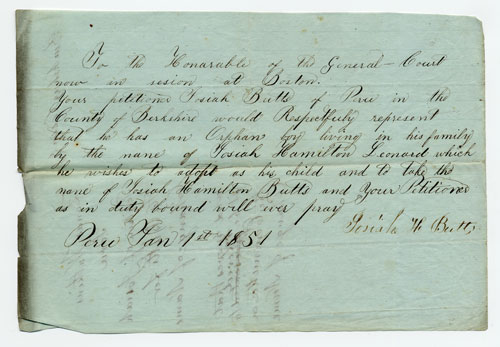
Petition requesting a name change due to an adoption, 1851
Adoptions
Genealogists should remember that many adoptions were never recorded legally. Children were frequently sent out of their families to live with other people, including relatives. Other children went to live with neighbors, but were never adopted as part of the family.
As with name changes, some adoptions prior to 1852 were enacted through the General Court. The petition requesting the adoption and any accompanying legislative papers are available through the Massachusetts Archives. Chapter 324, Acts of 1851, transferred responsibility for adoptions to the probate courts. Records after 1851 are either held by the Judicial Archives, or are maintained in the courts. The returns of name changes, and the List of Persons Whose Names Have Been Changed in Massachusetts note when names were changed as a result of adoptions. Access to adoption records may be restricted, so researchers will need to contact the Judicial Archives guidance to obtain such access.
Suffolk County Deeds
Deeds for property in Suffolk County (1629-1800) are held by the Archives. Typically the records include the grantor and grantee, and the location and description of the property being transferred. The deeds are arranged in volumes chronologically, according to the date and time they were filed. The Massachusetts Archives holds the grantor and grantee indices for these deeds (1629-1800 only).
Suffolk County deeds dating 1801-Feb. 1924 are housed at the Massachusetts Archives facility, overseen by the Suffolk County Registry of Deeds. Indices for these deeds (1801- Feb. 1924), which are vital for use of the collection, are located at the Suffolk County Registry of Deeds, located at 24 New Chardon Street, Boston, MA 02114. Suffolk County deeds from 1924 to the present are held by the Registry at their New Chardon Street location.
Deeds for all other counties can be accessed through the individual county registries of deeds.
Suffolk County Deeds volume, 1701
African-American and Native American Resources
Many collections in the Massachusetts Archives are appropriate for genealogical research, regardless of the ethnic background of the family being researched. It is important to note that terms of ethnicity and color were recorded inconsistently in federal and state records. In addition to the collections noted in this booklet, there are additional archival records that would be particularly useful to people researching African-American and Native American families. These include the 1754 slave census, early nineteenth-century applications and registers of state-issued passports, and applications for southern travel (1842-1845, 1862). The records of the Guardians of Indian Plantations provide detailed financial records of land sales and poor relief for Native Americans living in Massachusetts. A census of the Mashpee Indians, taken in 1832, is also included in the records of the Guardians. Additional census information is located in the 1861 Report Concerning the Indians of the Commonwealth, written by J.M. Earle. The report on the 1870 census of Mashpee, written by Richard L. Pease, is not held at the Archives, but can be accessed at the Massachusetts State Library.
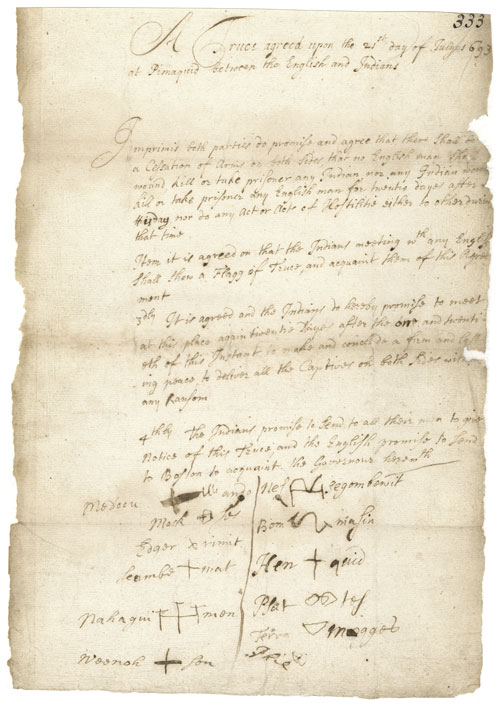
A truce agreed upon the 21st day of July 1693 at Pimaquid between the English and the Indians, taken from the Massachusetts Archives Collection, volume 30
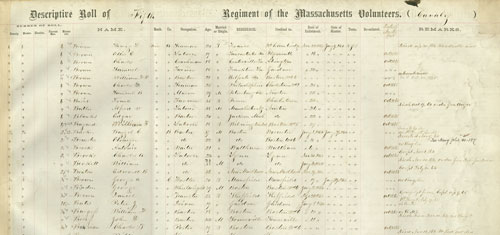
Descriptive roll of the Fifth Cavalry from 1865
Additional Collections
Other collections held by the Archives, not usually associated with genealogical research, may also provide information on families or individuals. These include collections such as maps and plans, legislative papers, and photographs relating to the construction of the Quabbin Reservoir.
Many maps, especially those of towns in Maine, include settlers' names with their residences or lots. These maps are often associated with legislative action or material in the Eastern Lands papers.
Legislative records, available for passed and unpassed bills, may include petitions, remonstrances, and copies of local records, in addition to the proposed bill. This documentation may provide information about specific individuals, especially if the legislation concerned a land grant, or the incorporation of a town, religious society, social organization, or business.
Records of the Metropolitan District Water Supply Commission include photographs of real estate in the "drowned towns"of Dana, Enfield, Greenwich, and Prescott that were taken during the construction of the Quabbin Reservoir. The collection also includes photographs of gravestones in the town cemeteries that were moved away from the reservoir site.
Prince Hall's petition, resulting in an act abolishing the slave trade in Massachusetts, Acts of 1787 ch.48
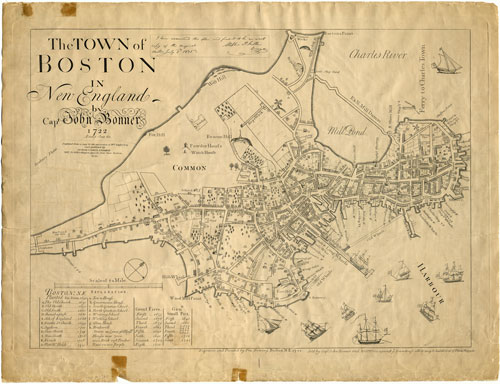
Map of Boston made by Capt. John Bonner in 1722


